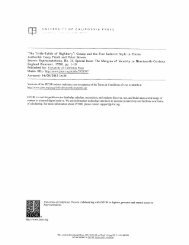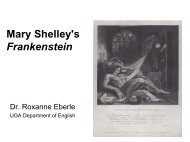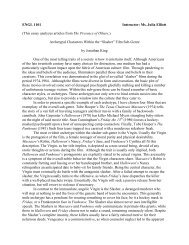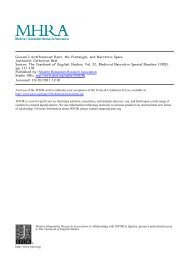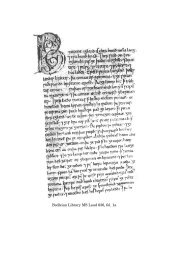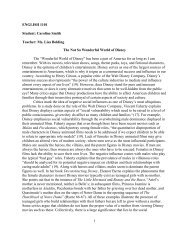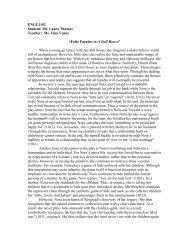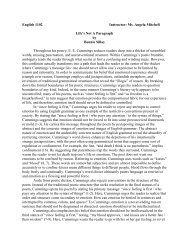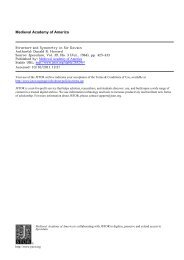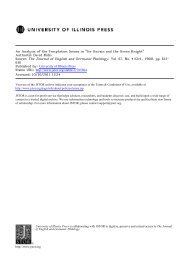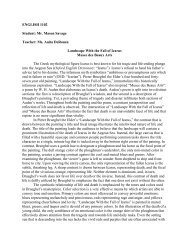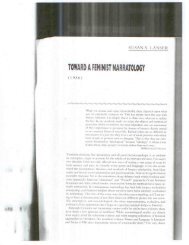The Significance of the Hunting Scenes in Sir Gawain and the Green ...
The Significance of the Hunting Scenes in Sir Gawain and the Green ...
The Significance of the Hunting Scenes in Sir Gawain and the Green ...
You also want an ePaper? Increase the reach of your titles
YUMPU automatically turns print PDFs into web optimized ePapers that Google loves.
<strong>The</strong> <strong>Significance</strong> <strong>of</strong> <strong>the</strong> <strong>Hunt<strong>in</strong>g</strong> <strong>Scenes</strong> <strong>in</strong> <strong>Sir</strong> Gawa<strong>in</strong> <strong>and</strong> <strong>the</strong> <strong>Green</strong> Knight<br />
Author(s): Henry L. Savage<br />
Source: <strong>The</strong> Journal <strong>of</strong> English <strong>and</strong> Germanic Philology, Vol. 27, No. 1 (Jan., 1928), pp. 1-15<br />
Published by: University <strong>of</strong> Ill<strong>in</strong>ois Press<br />
Stable URL: http://www.jstor.org/stable/27703094 .<br />
Accessed: 10/10/2011 12:26<br />
Your use <strong>of</strong> <strong>the</strong> JSTOR archive <strong>in</strong>dicates your acceptance <strong>of</strong> <strong>the</strong> Terms & Conditions <strong>of</strong> Use, available at .<br />
http://www.jstor.org/page/<strong>in</strong>fo/about/policies/terms.jsp<br />
JSTOR is a not-for-pr<strong>of</strong>it service that helps scholars, researchers, <strong>and</strong> students discover, use, <strong>and</strong> build upon a wide range <strong>of</strong><br />
content <strong>in</strong> a trusted digital archive. We use <strong>in</strong>formation technology <strong>and</strong> tools to <strong>in</strong>crease productivity <strong>and</strong> facilitate new forms<br />
<strong>of</strong> scholarship. For more <strong>in</strong>formation about JSTOR, please contact support@jstor.org.<br />
http://www.jstor.org<br />
University <strong>of</strong> Ill<strong>in</strong>ois Press is collaborat<strong>in</strong>g with JSTOR to digitize, preserve <strong>and</strong> extend access to <strong>The</strong> Journal<br />
<strong>of</strong> English <strong>and</strong> Germanic Philology.
THE SIGNIFICANCE OF THE HUNTING SCENES<br />
IN<br />
SIR GAWAIN AND THE GREEN KNIGHT<br />
I have <strong>of</strong>ten wondered why <strong>the</strong> author <strong>of</strong> <strong>Sir</strong> Gawa<strong>in</strong> <strong>and</strong><br />
<strong>the</strong> <strong>Green</strong> Knight should have recounted <strong>the</strong> hunt<strong>in</strong>g exploits<br />
<strong>of</strong> <strong>the</strong> lord <strong>of</strong> <strong>the</strong> castle with such a wealth <strong>of</strong> description.<br />
Some 280 l<strong>in</strong>es <strong>of</strong> <strong>the</strong> poem are devoted to <strong>the</strong> hunt<strong>in</strong>g scenes,<br />
<strong>and</strong> some 370 to <strong>the</strong> <strong>in</strong>terviews between <strong>Sir</strong> Gawa<strong>in</strong> <strong>and</strong> <strong>the</strong><br />
lady. While vivid descriptions are characteristic <strong>of</strong> <strong>the</strong> Gawa<strong>in</strong><br />
poet, he rarely digresses for <strong>the</strong> sake <strong>of</strong> mere description, or<br />
"pads" a narrative with episodes or details that are extraneous<br />
to his ma<strong>in</strong> <strong>the</strong>me. <strong>The</strong> accounts <strong>of</strong> <strong>the</strong> chase <strong>in</strong> <strong>the</strong> poem<br />
certa<strong>in</strong>ly warrant us <strong>in</strong> regard<strong>in</strong>g <strong>the</strong>ir author as a keen sports<br />
man, a<br />
worthy<br />
ancestor <strong>of</strong><br />
"John Peel," Baker, Selous, <strong>and</strong><br />
Baillie-Grohman; but does not <strong>the</strong>ir apparent importance <strong>in</strong><br />
<strong>the</strong> m<strong>in</strong>d <strong>of</strong> <strong>the</strong> poet mean that <strong>the</strong>y are more closely connected<br />
with <strong>the</strong> events go<strong>in</strong>g on all <strong>the</strong> while at <strong>the</strong> castle than we,<br />
perhaps, have realized? <strong>The</strong> poet has <strong>in</strong>deed bound toge<strong>the</strong>r<br />
<strong>the</strong> events tak<strong>in</strong>g place <strong>in</strong>doors with those go<strong>in</strong>g on out-<strong>of</strong><br />
doors by means <strong>of</strong> <strong>the</strong> "forwarde" that <strong>the</strong> lord <strong>and</strong> his guest<br />
shall exchange with one ano<strong>the</strong>r what each has captured<br />
dur<strong>in</strong>g <strong>the</strong> day. But is it not possible that an even closer nexus<br />
between <strong>the</strong> hunt<strong>in</strong>g scenes <strong>and</strong> <strong>the</strong> happen<strong>in</strong>gs at <strong>the</strong> castle<br />
may be found? Certa<strong>in</strong> facts about <strong>the</strong> animals which formed<br />
<strong>the</strong> quarry <strong>of</strong> <strong>the</strong> mediaeval huntsman, to be found <strong>in</strong> <strong>the</strong><br />
hunt<strong>in</strong>g treatises <strong>of</strong> <strong>the</strong> time, <strong>and</strong> certa<strong>in</strong> popular beliefs about<br />
<strong>the</strong>ir habits <strong>and</strong> tempers that were promulgated by <strong>the</strong> practices<br />
<strong>and</strong> pronouncements <strong>of</strong> heraldry, will, I believe, enable us to<br />
see that <strong>the</strong> two series <strong>of</strong> events are l<strong>in</strong>ked not only by <strong>the</strong><br />
"forwarde," but also by a certa<strong>in</strong> parallelism <strong>in</strong> <strong>the</strong>ir situations<br />
which would probably be quite apparent to <strong>the</strong> lady or gentle<br />
man <strong>of</strong> <strong>the</strong> fourteenth century.<br />
<strong>The</strong> key to an underst<strong>and</strong><strong>in</strong>g <strong>of</strong> <strong>the</strong> raison d' ?tre <strong>of</strong> <strong>the</strong><br />
hunt<strong>in</strong>g scenes lies, I believe, <strong>in</strong> <strong>the</strong> attidue <strong>of</strong> <strong>the</strong> mediaeval<br />
hunter <strong>and</strong> herald towards <strong>the</strong> several beasts whose chase<br />
<strong>the</strong> poem records. Let us exam<strong>in</strong>e first <strong>the</strong> treatises <strong>in</strong> which<br />
<strong>the</strong> rules <strong>and</strong> practices <strong>of</strong> venery are set forth. <strong>The</strong> m<strong>in</strong>d<br />
<strong>of</strong> <strong>the</strong> Middle Ages loved order <strong>and</strong> <strong>the</strong> relegation <strong>of</strong> <strong>the</strong> <strong>in</strong>di<br />
1
2 Savage<br />
vidual to his proper <strong>in</strong>clusive class, <strong>and</strong> <strong>the</strong> practices <strong>and</strong> cus<br />
toms <strong>of</strong> hunt<strong>in</strong>g well exemplify this trait. Game animals were<br />
classed as ei<strong>the</strong>r "beasts <strong>of</strong> venery" or "beasts <strong>of</strong> chase."1 To<br />
<strong>the</strong> first class belong <strong>the</strong> stag <strong>and</strong> h<strong>in</strong>d (male <strong>and</strong> female <strong>of</strong> <strong>the</strong><br />
red deer, cervus elaphus), <strong>the</strong> wild boar, <strong>and</strong> <strong>the</strong> wolf; to <strong>the</strong><br />
second, <strong>the</strong> buck <strong>and</strong> doe (male <strong>and</strong> female <strong>of</strong> <strong>the</strong> fallow deer,<br />
cervus dama), <strong>the</strong> roe deer [capreolus caprea), <strong>the</strong> mart<strong>in</strong>, <strong>and</strong><br />
<strong>the</strong> fox. This division had no legal significance, <strong>and</strong> meant no<br />
more than <strong>the</strong> fact that certa<strong>in</strong> beasts were hunted <strong>in</strong> one way,<br />
<strong>and</strong> certa<strong>in</strong> o<strong>the</strong>rs <strong>in</strong> ano<strong>the</strong>r.2 It is possible that a higher<br />
prestige or dist<strong>in</strong>ction was attached to <strong>the</strong> pursuit <strong>and</strong> slay<strong>in</strong>g <strong>of</strong><br />
<strong>the</strong> animals <strong>of</strong> <strong>the</strong> first class, because we f<strong>in</strong>d <strong>the</strong>m also listed as<br />
"beasts <strong>of</strong> <strong>the</strong> forest," i.e. beasts that were protected by <strong>the</strong> law<br />
that governed <strong>the</strong> royal forests, while <strong>the</strong>y lived on <strong>the</strong> l<strong>and</strong> that<br />
formed part <strong>of</strong> <strong>the</strong> forest doma<strong>in</strong>; whereas <strong>the</strong> animals <strong>of</strong> <strong>the</strong> sec<br />
ond class, while <strong>the</strong>y lived <strong>in</strong> a chase (enclosure), were protected<br />
only by <strong>the</strong> common law. It is probable that, at <strong>the</strong> time at<br />
which <strong>the</strong> Gawa<strong>in</strong>-poet was writ<strong>in</strong>g, dist<strong>in</strong>ctions between <strong>the</strong> two<br />
classes, apart from <strong>the</strong> difference between <strong>the</strong> penalties <strong>in</strong>curred<br />
by a poacher, accord<strong>in</strong>g as he killed <strong>in</strong> a royal forest or <strong>in</strong> a chase,<br />
were nil; <strong>and</strong> that any early differences <strong>in</strong> <strong>the</strong> manner <strong>of</strong> hunt<br />
<strong>in</strong>g <strong>the</strong> various beasts tended to disappear with <strong>the</strong> passage <strong>of</strong><br />
time. Certa<strong>in</strong>ly we f<strong>in</strong>d Bercilak hunt<strong>in</strong>g h<strong>in</strong>ds (females <strong>of</strong> <strong>the</strong>,<br />
red deer) <strong>and</strong> does (females <strong>of</strong> <strong>the</strong> fallow deer) at one <strong>and</strong> <strong>the</strong><br />
same time, with no difference <strong>of</strong> method because <strong>of</strong> <strong>the</strong> differ<br />
ence <strong>in</strong> category. <strong>The</strong> animals hunted on <strong>the</strong> first two days,<br />
<strong>the</strong> two species <strong>of</strong> deer <strong>and</strong> <strong>the</strong> wild boar, were favorites among<br />
mediaeval hunters because <strong>of</strong> <strong>the</strong> good "runs" <strong>the</strong>y gave, "runs"<br />
varied by <strong>the</strong> habit <strong>of</strong> <strong>the</strong> red deer <strong>of</strong> tak<strong>in</strong>g to water,3 <strong>and</strong> by<br />
that <strong>of</strong> <strong>the</strong> wild boar <strong>of</strong> turn<strong>in</strong>g frequently to bay.4<br />
But if <strong>the</strong> red deer, <strong>the</strong> fallow deer, <strong>and</strong> <strong>the</strong> boar were<br />
favorites, <strong>the</strong>re was no such feel<strong>in</strong>g <strong>of</strong> admiration for <strong>the</strong> fox.<br />
It seems quite clear that at <strong>the</strong> time at which our author<br />
1<br />
Cf. Le Venery de Twety, ?d. Wright <strong>and</strong> Halliwell <strong>in</strong> Reliquia Antiques<br />
(London, 1841), I, 150; Booke <strong>of</strong> S. Albans (London, 1598), p. 30. See also <strong>the</strong><br />
article on "Forest Laws" <strong>in</strong> Encyclop dia Britannica<br />
*<br />
Cf. Select Pleas <strong>of</strong><br />
(X, 644-645).<br />
<strong>the</strong> Forest, ed. G. J. Turner, Seiden Soc. XIII (London,<br />
1901), pp. a?v-exv.<br />
3<br />
See l<strong>in</strong>e 1169. For more detailed discussion <strong>of</strong> this habit, cf. Master <strong>of</strong><br />
Game, ed. W. A. <strong>and</strong> F. Baillie-Grohman (New York, 1909), pp. 32-33.<br />
4<br />
See l<strong>in</strong>e 1450. Cf. Master <strong>of</strong> Game, pp. 50-51.
<strong>Sir</strong> Gawa<strong>in</strong> <strong>and</strong> <strong>Green</strong> Knight 3<br />
wrote <strong>the</strong> fox was regarded as verm<strong>in</strong> to be hunted out <strong>and</strong> des<br />
troyed.5<br />
<strong>The</strong> words <strong>in</strong> which Bercilak replies to Gawa<strong>in</strong>'s <strong>in</strong>quiry as<br />
to <strong>the</strong> success <strong>of</strong> his third day's sport allow us to see that<br />
<strong>the</strong> hunter took little pride <strong>in</strong> that day's quarry:<br />
For I haf hunted al J?is day, <strong>and</strong> no 5t haf I geten<br />
Bot )?is foule fox felle-fce fende haf }?e gode3l6<br />
Mr. Baillie-Grohman's note (pp. 65-66) <strong>in</strong> <strong>the</strong> chapter<br />
on <strong>the</strong><br />
fox <strong>in</strong> <strong>the</strong> Master <strong>of</strong> Game makes it quite clear that Bercilak's<br />
attitude toward <strong>the</strong> victim <strong>of</strong> his third day's sport was <strong>the</strong><br />
ord<strong>in</strong>ary <strong>and</strong> usual one among mediaeval hunters:<br />
Our MS. only gives this one chapter on <strong>the</strong> fox, while Gaston Ph bus has<br />
ano<strong>the</strong>r: Comment on doit chassier et prendre le renard. In this he gives directions<br />
as to earth-stopp<strong>in</strong>g, <strong>and</strong> tak<strong>in</strong>g him <strong>in</strong> pursenets, <strong>and</strong> smok<strong>in</strong>g him out with<br />
"orpiment <strong>and</strong> sulphur <strong>and</strong> nitre or saltpetre." He says January, February, <strong>and</strong><br />
March are <strong>the</strong> best months for hunt<strong>in</strong>g, as <strong>the</strong> leaf is <strong>of</strong>f <strong>the</strong> trees <strong>and</strong> coverts<br />
are clearer, so that <strong>the</strong> hounds have more chance <strong>of</strong> see<strong>in</strong>g <strong>the</strong> fox <strong>and</strong> hunt<br />
him closer. He says that one-third <strong>of</strong> <strong>the</strong> hounds should be put <strong>in</strong> t^ draw <strong>the</strong><br />
covert, <strong>and</strong> o<strong>the</strong>rs <strong>in</strong> relays should guard <strong>the</strong> boundaries <strong>and</strong> paths,<br />
to be<br />
slipped<br />
as<br />
required.7 Although this is a Frenchman's account <strong>of</strong> fox-hunt<strong>in</strong>g,<br />
we have no reason to believe that <strong>the</strong> fox was treated at that period better by<br />
English sportsmen, for until comparatively recent times <strong>the</strong> fox was accounted<br />
verm<strong>in</strong>, <strong>and</strong> any means by which his death could be encompassed<br />
were con<br />
sidered legitimate, his exterm<strong>in</strong>ation be<strong>in</strong>g <strong>the</strong> chief object <strong>in</strong> hunt<strong>in</strong>g him,<br />
<strong>and</strong> not <strong>the</strong> sport. Even as late as <strong>the</strong> seventeenth century we f<strong>in</strong>d that such<br />
treatment was considered justifiable towards a fox, for, as Macaulay tells us,<br />
Oliver St. John told <strong>the</strong> Long Parliament that Strafford was to be regarded,<br />
not as a stag or hare, to whom some law was. to be given, but as a fox, who<br />
was to be snared by any means, <strong>and</strong> knocked on <strong>the</strong> head without pity (vol. I,<br />
p. 149).<br />
Corroboration <strong>of</strong> <strong>the</strong> existence <strong>of</strong> this attitude is not want<strong>in</strong>g.<br />
In his catalogue <strong>of</strong> <strong>the</strong> "beasts <strong>of</strong> <strong>the</strong> chase" Twici refers<br />
5 Though <strong>the</strong> fox was regarded as a noxious animal, it might appear as<br />
though some grace were to be extended to him, for Twici (p. 154) tells us that<br />
<strong>the</strong> fox-hunt<strong>in</strong>g<br />
season<br />
opened<br />
on <strong>the</strong> day <strong>of</strong> <strong>the</strong> Nativity <strong>of</strong> Our Lady <strong>and</strong><br />
extended till <strong>the</strong> Annunciation. <strong>The</strong> period <strong>of</strong> closed season, however, which<br />
covers roughly <strong>the</strong> present season, as observed by <strong>the</strong> best English <strong>and</strong> American<br />
packs, probably existed more for <strong>the</strong> convenience <strong>of</strong> <strong>the</strong> hunters, whose revenues<br />
depended<br />
<strong>the</strong> fox.<br />
on <strong>the</strong> crops grow<strong>in</strong>g dur<strong>in</strong>g <strong>the</strong> closed season, than for <strong>the</strong> ease <strong>of</strong><br />
6<br />
L<strong>in</strong>es 1943-1944.<br />
7<br />
This is <strong>the</strong> manner <strong>in</strong> which <strong>the</strong> fox is hunted <strong>in</strong> <strong>the</strong> poem. In l<strong>in</strong>es 1712<br />
1715, 1727 Reynard runs <strong>in</strong>to just such relay stations.
4 Savage<br />
specifically to <strong>the</strong> rough treatment which Reynard must expect<br />
from <strong>the</strong> hunters:<br />
And <strong>the</strong>r ben othyr bestis .v. <strong>of</strong> chase;<br />
<strong>The</strong> buk <strong>the</strong> first, <strong>the</strong> do <strong>the</strong> secunde,<br />
<strong>The</strong> fox <strong>the</strong> thryde, whiche <strong>of</strong>te hath hard grace,<br />
<strong>The</strong> fer<strong>the</strong> <strong>the</strong> martyn, <strong>and</strong> <strong>the</strong> last <strong>the</strong> roo.8<br />
That this op<strong>in</strong>ion <strong>of</strong> <strong>the</strong> fox found expression <strong>in</strong> <strong>the</strong> laws govern<br />
<strong>in</strong>g <strong>the</strong> adm<strong>in</strong>istration <strong>of</strong> hunt<strong>in</strong>g preserves, such as royal<br />
forests, chases, parks, <strong>and</strong> warrens, is eloquent testimony to<br />
its widespread prevalence.9<br />
Such an attitude toward canis vulpes was probably due <strong>in</strong><br />
large measure to <strong>the</strong> reputation for cunn<strong>in</strong>g <strong>and</strong> duplicity<br />
which he has always held.10 <strong>The</strong> Master <strong>of</strong> Game <strong>in</strong>forms us<br />
that "she (<strong>the</strong> fox) is a false beast <strong>and</strong> as malicious as a wolf,"11<br />
<strong>and</strong> goes on to say that "<strong>the</strong>y are so<br />
cunn<strong>in</strong>g <strong>and</strong> subtle that<br />
nei<strong>the</strong>r men nor hounds can f<strong>in</strong>d a remedy to keep <strong>the</strong>mselves<br />
from <strong>the</strong>ir false turns."12 When <strong>the</strong> fox eludes his pursuers<br />
by go<strong>in</strong>g to earth, "<strong>the</strong>n men may dig him out <strong>and</strong> take<br />
him."13 Certa<strong>in</strong>ly <strong>the</strong> hunters <strong>in</strong> our poem recognize <strong>the</strong>ir<br />
rufous opponent as a tricky <strong>and</strong> wily fellow, deserv<strong>in</strong>g <strong>of</strong> much<br />
opprobrium because <strong>of</strong> his "false turns'* <strong>and</strong> underground<br />
habits:<br />
Here he wat3 halawed, when ha)?ele3 hym metten,<br />
Loude he wat3 3ayned with 3ar<strong>and</strong>e speche;<br />
per he wat3 J?reted <strong>and</strong> <strong>of</strong>te J?e? called.14<br />
Let us now turn to <strong>the</strong> story <strong>of</strong> our poem. Bercilak rouses<br />
on <strong>the</strong> first day <strong>of</strong> his hunt<strong>in</strong>g large numbers <strong>of</strong> deer, <strong>of</strong> both<br />
8 P. 150. <strong>The</strong> italics are my own.<br />
9 For <strong>the</strong> status <strong>of</strong> <strong>the</strong> fox <strong>in</strong> law, see Select Pleas <strong>of</strong> <strong>the</strong> Forest, pp. cxiv-cxv,<br />
cxrix, cxxx, cxxxi. Turner (p. cxxxii) gives some evidence that <strong>the</strong> fox was<br />
legally held to be a beast <strong>of</strong> warren. If such be <strong>the</strong> case, it is almost certa<strong>in</strong><br />
that <strong>the</strong> fox was regarded <strong>in</strong> <strong>the</strong> eyes <strong>of</strong> <strong>the</strong> law as a beast <strong>of</strong> verm<strong>in</strong>.<br />
10 It is probably because <strong>of</strong> this reputation for cunn<strong>in</strong>g <strong>and</strong> duplicity ra<strong>the</strong>r<br />
than for its notorious reputation as a poultry thief that <strong>the</strong> animal was regarded<br />
as a pest. <strong>The</strong> wolf was far more destructive to man <strong>and</strong> domesticated animals<br />
(cf. Master <strong>of</strong> Game, pp. 59,61, 62), yet it was not<br />
regarded<br />
as a beast <strong>of</strong> verm<strong>in</strong>.<br />
Men hated it, but <strong>the</strong>ir hate was m<strong>in</strong>gled with a<br />
hearty respect, bred <strong>of</strong> its<br />
ferocious nature.<br />
UP.64.<br />
12<br />
P. 67.<br />
13<br />
P. 65.<br />
14<br />
L<strong>in</strong>es 1723-1725.
<strong>Sir</strong> Gawa<strong>in</strong> <strong>and</strong> <strong>Green</strong> Knight 5<br />
red <strong>and</strong> fallow species. <strong>The</strong>se he hunts <strong>in</strong> approved manner,<br />
be<strong>in</strong>g careful to slay no stags or bucks, which were <strong>the</strong>n under<br />
<strong>the</strong> protection <strong>of</strong> <strong>the</strong> closed season.15 On <strong>the</strong> second day<br />
a<br />
huge boar is roused, who leads <strong>the</strong> hunt a merry chase, <strong>and</strong><br />
afterwards turns f<strong>in</strong>ally <strong>and</strong> fiercely to bay, where he is sla<strong>in</strong><br />
by <strong>the</strong> lord. On <strong>the</strong> third day a fox is started. Reynard pro<br />
vides great sport, <strong>and</strong> is brought down immediately <strong>in</strong> front<br />
<strong>of</strong> Bercilak's horse. So close is he to <strong>the</strong> lord, that Bercilak<br />
strikes at him with his weapon, but misses, because <strong>the</strong> fox at<br />
that <strong>in</strong>stant dodges. His dodge avails him noth<strong>in</strong>g, however,<br />
for a dog seizes him at <strong>the</strong> moment that he avoids <strong>the</strong> descend<br />
<strong>in</strong>g blade, <strong>and</strong> <strong>the</strong> whole pack falls on him at once.<br />
Now, dur<strong>in</strong>g <strong>the</strong> first day's hunt<strong>in</strong>g while her husb<strong>and</strong> is<br />
pursu<strong>in</strong>g <strong>the</strong> h<strong>in</strong>ds <strong>and</strong> does, <strong>the</strong> lady is seek<strong>in</strong>g to tempt<br />
Gawa<strong>in</strong>. Her attempt, however, is unsuccessful. She f<strong>in</strong>ds<br />
herself, like her husb<strong>and</strong>, pursu<strong>in</strong>g ''noble game." <strong>The</strong> ameni<br />
ties <strong>and</strong> decencies that mark <strong>the</strong> conduct <strong>and</strong> pursuits <strong>of</strong><br />
gentlefolk<br />
are<br />
preserved both <strong>in</strong> forest <strong>and</strong> castle. On <strong>the</strong> second<br />
day she is no more successful. Like her husb<strong>and</strong> <strong>in</strong> <strong>the</strong> forest,<br />
she has<br />
aga<strong>in</strong><br />
roused "noble<br />
game."<br />
On <strong>the</strong> third day, however, Bercilak routs out a beast <strong>of</strong><br />
verm<strong>in</strong>, a creature <strong>of</strong> craft <strong>and</strong> duplicity. And it is upon that<br />
very day that Gawa<strong>in</strong> breaks his "forwarde," <strong>and</strong> <strong>the</strong>reby<br />
<strong>in</strong>curs <strong>the</strong> guilt <strong>of</strong> be<strong>in</strong>g false to his knightly word <strong>and</strong> de<br />
ceitful to a generous <strong>and</strong> trust<strong>in</strong>g host. While it is true that<br />
<strong>the</strong> pressure <strong>of</strong> his hostess makes it difficult for him to refuse<br />
her gift <strong>of</strong> <strong>the</strong> green lace, yet <strong>the</strong> decid<strong>in</strong>g factor that prompts<br />
his acceptance <strong>of</strong> it is fear for his own neck. Thus fear for his<br />
life has led him to avail himself <strong>of</strong> a "false turn."16 On <strong>the</strong><br />
third day, <strong>the</strong>n, a false beast is roused <strong>in</strong> <strong>the</strong> forest, <strong>and</strong> a false<br />
man revealed <strong>in</strong> <strong>the</strong> castle; a sly fox is caught <strong>in</strong> <strong>the</strong> wood, a<br />
"sly fox" <strong>in</strong> <strong>the</strong> castle.<br />
But <strong>the</strong> parallelism between <strong>the</strong> last day's hunt<strong>in</strong>g <strong>in</strong> <strong>the</strong><br />
15 L<strong>in</strong>es 1156-1157:<br />
For Ipe fre lorde hade d?fende <strong>in</strong> fermysoun tyme<br />
pat ??er schulde no mon meue to j?e male dere.<br />
<strong>The</strong> adjective "fre3' is <strong>in</strong>dicative <strong>of</strong> Bercilak's reputation for good sportsmanship.<br />
14 Fear <strong>of</strong> his life leads Gawa<strong>in</strong> to commit a base action. Cf. Master <strong>of</strong><br />
Game, pp. 65-66 for an account <strong>of</strong> certa<strong>in</strong> base vulp<strong>in</strong>e habits that are revealed<br />
when Reynard is hard pressed by <strong>the</strong> greyhounds.
6 Savage<br />
wood <strong>and</strong> <strong>the</strong> events <strong>of</strong> that day <strong>in</strong> <strong>the</strong> castle may be worked<br />
out to an even closer<br />
degree<br />
<strong>of</strong><br />
correspondence. Attention was<br />
called above to <strong>the</strong> rapid series <strong>of</strong> actions which led to <strong>the</strong><br />
death <strong>of</strong> <strong>the</strong> fox. I shall allow <strong>the</strong> poet to tell his own story:<br />
Renaud com richch<strong>and</strong>e J?ur3 a ro3e greue,<br />
And alie pe rabel <strong>in</strong> a res 173t at his heles.<br />
pe wy3e wat3 war <strong>of</strong> pe wylde, <strong>and</strong> warly abides,<br />
And braydes out pe bryst bronde, <strong>and</strong> at pe best caste3.<br />
And he schunt for pe scharp, <strong>and</strong> schulde haf arered;<br />
A rach rapes hym to, ry3t er he my$t,<br />
And ry3t bifore pe hors fete pay fel on hym alle,<br />
And woried me pis wyly wyth<br />
a wroth noyse.17<br />
In <strong>the</strong> endeavor to avoid <strong>the</strong> danger from <strong>the</strong> lord's blade,<br />
Reynard "shunts," <strong>and</strong> attempts to reverse direction, but his<br />
very shift carries him <strong>in</strong>to <strong>the</strong> jaws <strong>of</strong> his enemies.<br />
<strong>The</strong> correspondence between <strong>the</strong> case <strong>of</strong> Reynard <strong>and</strong> that<br />
<strong>of</strong> <strong>Sir</strong> Gawa<strong>in</strong> is very close. In <strong>the</strong> endeavor to avoid <strong>the</strong> fate<br />
which threatens him, <strong>the</strong> fox resorts to a bit <strong>of</strong> trickery, <strong>and</strong><br />
that bit <strong>of</strong> trickery is <strong>the</strong> very cause <strong>of</strong> his undo<strong>in</strong>g. <strong>The</strong> posi<br />
tion <strong>of</strong> Gawa<strong>in</strong> is <strong>the</strong> same: <strong>in</strong> his desire to avoid death from<br />
<strong>the</strong> impend<strong>in</strong>g blow, he resorts to trickery, <strong>and</strong> his recourse to<br />
duplicity proves <strong>the</strong> sole <strong>and</strong> only cause <strong>of</strong> his disgrace. Thus<br />
<strong>the</strong> two situations closely resemble one ano<strong>the</strong>r. Before clos<strong>in</strong>g<br />
our discussion <strong>of</strong> <strong>the</strong> evidence afforded by <strong>the</strong> hunt<strong>in</strong>g treat<br />
ises, a fur<strong>the</strong>r correspondence between <strong>the</strong> details <strong>of</strong> Reynard's<br />
death <strong>and</strong> <strong>the</strong> conduct <strong>of</strong> Gawa<strong>in</strong> should be noted. <strong>The</strong> <strong>the</strong>atre<br />
<strong>of</strong> events, as far as <strong>the</strong> human actor is concerned, is not now<br />
at <strong>the</strong> castle, but at <strong>the</strong> <strong>Green</strong> Chapel. <strong>The</strong>re, as on <strong>the</strong> day<br />
before, is <strong>the</strong> uplifted blade <strong>and</strong> <strong>the</strong> <strong>in</strong>st<strong>in</strong>ctive movement <strong>of</strong><br />
avoidance.18<br />
In trac<strong>in</strong>g <strong>the</strong> parallelism between <strong>the</strong> two series <strong>of</strong> events,<br />
we have relied almost entirely upon evidence to be garnered<br />
from <strong>the</strong> hunt<strong>in</strong>g treatises <strong>of</strong> <strong>the</strong> time, but we must not neg<br />
17 L<strong>in</strong>es 1898-1905. Some words <strong>of</strong> <strong>Sir</strong> Thomas Cocka<strong>in</strong>e, author <strong>of</strong> A Short<br />
Treatise <strong>of</strong> <strong>Hunt<strong>in</strong>g</strong>, compyled for tlie Deligid <strong>of</strong> Noblemen & Gentlemen (London,<br />
1591), expla<strong>in</strong> Bercilak's action (quoted <strong>in</strong> Badm<strong>in</strong>ton Library: <strong>Hunt<strong>in</strong>g</strong>, p. 27) :<br />
"Every huntsman his part is to hew [ = shout?] him, or backe him <strong>in</strong>to <strong>the</strong> covert<br />
aga<strong>in</strong> when he <strong>of</strong>fereth to breake <strong>the</strong> same."<br />
14<br />
Similarity between <strong>the</strong> two situations is to be found even <strong>in</strong> <strong>the</strong>ir phrase<br />
ology. Cf. l<strong>in</strong>e 1902 (account <strong>of</strong> <strong>the</strong> death <strong>of</strong> <strong>the</strong> fox) with l<strong>in</strong>es 2267-2268<br />
(description <strong>of</strong> Gawa<strong>in</strong>'s <strong>in</strong>st<strong>in</strong>ctive movement <strong>of</strong> avoidance).
<strong>Sir</strong> Gawa<strong>in</strong> <strong>and</strong> <strong>Green</strong> Knight 7<br />
lect ano<strong>the</strong>r field that may be gleaned, I believe, with good<br />
results?that <strong>of</strong> heraldry. <strong>The</strong> hunt<strong>in</strong>g treatises do, <strong>in</strong>deed,<br />
tell us that such animals as harts, h<strong>in</strong>ds, <strong>and</strong> boars are to be<br />
classed toge<strong>the</strong>r, because <strong>the</strong>ir pursuit is more elevat<strong>in</strong>g <strong>and</strong><br />
noble than that <strong>of</strong> <strong>the</strong> fox; <strong>the</strong>y do differentiate between<br />
"beasts <strong>of</strong> venery (or forest)" <strong>and</strong> "beasts <strong>of</strong> chase"; but <strong>the</strong>y<br />
do not tell us just what were <strong>the</strong> qualities that entitle us to<br />
place beasts that possessed <strong>the</strong>m <strong>in</strong> <strong>the</strong> higher <strong>of</strong> <strong>the</strong> two cate<br />
gories last mentioned. We can see why it is that <strong>the</strong> hart <strong>and</strong><br />
<strong>the</strong> boar are regarded more highly than <strong>the</strong> fox, but we can<br />
not see just what qualities <strong>in</strong> <strong>the</strong> hart <strong>and</strong> <strong>the</strong> boar led to <strong>the</strong>ir<br />
be<strong>in</strong>g listed as "beasts <strong>of</strong> venery." <strong>The</strong> two animals are char<br />
acterized by attributes that would seem to mark <strong>the</strong>m <strong>of</strong>f as<br />
unlike; what is <strong>the</strong> trait, or traits, that prompted <strong>the</strong> medi<br />
aeval Nimrod to place <strong>the</strong>m both with<strong>in</strong> a<br />
s<strong>in</strong>gle class, <strong>and</strong><br />
that <strong>the</strong> most elevated? To learn <strong>the</strong> peculiar attributes<br />
which differentiated <strong>the</strong>se beasts <strong>in</strong> <strong>the</strong> m<strong>in</strong>ds <strong>of</strong> <strong>the</strong>ir pursuers,<br />
we must turn to <strong>the</strong> science <strong>of</strong> heraldry, for <strong>in</strong> heraldry, as M.<br />
Gevaert tells us,19 <strong>the</strong>re is to be found <strong>the</strong> impr<strong>in</strong>t <strong>of</strong> <strong>the</strong><br />
common ideas <strong>and</strong> <strong>the</strong> popular op<strong>in</strong>ion. <strong>The</strong> books on hunt<strong>in</strong>g<br />
assume a familiarity with this common notion or popular idea<br />
<strong>of</strong> <strong>the</strong> animal, as <strong>the</strong> Master <strong>of</strong> Game allows us to see;20 hence<br />
<strong>in</strong> <strong>the</strong>m we shall probably not f<strong>in</strong>d much discussion or analysis<br />
<strong>of</strong> those qualities or traits <strong>in</strong> which <strong>the</strong> brute creation would<br />
seem to resemble man.<br />
<strong>The</strong> day <strong>of</strong> heraldry is past, <strong>and</strong> modern zoology has told<br />
us, whe<strong>the</strong>r rightly or wrongly, that we<br />
ought not to attribute<br />
to animals <strong>the</strong> spiritual, emotional, or mental qualities <strong>of</strong><br />
19 "D'une fa?on g?n?rale, l'empre<strong>in</strong>te de cette morale monda<strong>in</strong>e se re*<br />
conna?t sur toute<br />
l'h?raldique" (E. Gevaert, UH?raldique (Paris, no date)?<br />
p. 32). Gevaert's words on <strong>the</strong> allegorical mean<strong>in</strong>g <strong>of</strong> certa<strong>in</strong> <strong>of</strong> <strong>the</strong> more<br />
familiar beasts deserve quotation with reference to previous discussion <strong>of</strong> <strong>the</strong><br />
fox (p. 32): "T<strong>and</strong>is que les figures exprimant l'orgueil <strong>in</strong>dividuel et affirmant<br />
la force sont fr?quentes, on ne rencontre gu?re, dans les armes, l'agneau qui<br />
repr?sente la douceur, le chameau, image de l'humilit?, de ia soumission et de<br />
l'ob?issance, ou le boeuf qui figure la<br />
patience. Leur raret? est ?gale ? celle<br />
du li?vre, image de la peur, ou ? celle du renard dont la ruse est <strong>in</strong>compatible<br />
avec l'honneur militaire."<br />
20<br />
Cf. p. 23: "<strong>The</strong> hart is a common beast enough <strong>and</strong> <strong>the</strong>refore me needeth<br />
not to tell <strong>of</strong> his mak<strong>in</strong>g, for <strong>the</strong>re be few folk that have not seen some." Cf.<br />
also pp. 46, 64 where boar <strong>and</strong> fox are <strong>in</strong>troduced <strong>in</strong> practically identical<br />
phraseology.
8 Savage<br />
which we ourselves are conscious. But when <strong>the</strong> author <strong>of</strong><br />
<strong>Sir</strong> Gawa<strong>in</strong> <strong>and</strong> <strong>the</strong> <strong>Green</strong> Knight wrote, heraldry was still<br />
<strong>in</strong>st<strong>in</strong>ct with mean<strong>in</strong>g for those who wore its <strong>in</strong>signia, <strong>and</strong> mod<br />
ern zoological op<strong>in</strong>ion was still to come. <strong>The</strong> fourteenth century<br />
would probably not have objected to <strong>the</strong> phrase which a<br />
modern writer has taken for <strong>the</strong> title <strong>of</strong> his book on natural<br />
history: "<strong>The</strong> M<strong>in</strong>ds <strong>and</strong> Manners <strong>of</strong> Wild Animals/'21 for to<br />
<strong>the</strong> men <strong>and</strong> women <strong>of</strong> that time wild animals had both m<strong>in</strong>ds<br />
<strong>and</strong> manners. Hence <strong>the</strong> appearance <strong>of</strong> a particular beast or<br />
bird upon crest or shield was sign <strong>and</strong> warrant to <strong>the</strong> world<br />
that <strong>the</strong> noble bearer (or his ancestors) had been dist<strong>in</strong>guished<br />
upon one or more occasions by <strong>the</strong> exhibition <strong>of</strong> qualities that<br />
corresponded with <strong>the</strong> traits for which that beast or bird was<br />
famous or notorious.<br />
Of <strong>the</strong> hart, or stag <strong>of</strong> <strong>the</strong> red deer, John Guillim, <strong>the</strong><br />
learned herald <strong>of</strong> <strong>the</strong> late sixteenth <strong>and</strong> early seventeenth<br />
centuries has <strong>the</strong> follow<strong>in</strong>g words to say <strong>in</strong> re <strong>the</strong> shield <strong>of</strong><br />
Jones <strong>of</strong> Monmouthshire: "Nature hav<strong>in</strong>g denied this Beast<br />
o<strong>the</strong>r Securities, hath <strong>in</strong>dued him with two excellent Favours<br />
above o<strong>the</strong>rs; <strong>the</strong> One, exceed<strong>in</strong>g Quickness <strong>of</strong> Hear<strong>in</strong>g, to<br />
foreknow his Hazards, <strong>and</strong> so <strong>the</strong> sooner to prevent <strong>the</strong>m (for<br />
which Cause <strong>the</strong> Stag is among <strong>the</strong> Emblems <strong>of</strong> <strong>the</strong> five Senses,<br />
represent<strong>in</strong>g <strong>the</strong> Hear<strong>in</strong>g) ; <strong>the</strong> o<strong>the</strong>r exceed<strong>in</strong>g Speed <strong>of</strong> Foot,<br />
to fly from <strong>the</strong> Danger when it approacheth;"22 <strong>and</strong> he<br />
remarks relative to <strong>the</strong> hart <strong>of</strong> <strong>the</strong> Holm family (upon <strong>the</strong><br />
authority <strong>of</strong> Upton) that <strong>the</strong> "Hart born <strong>in</strong> Arms ... betoken<br />
eth sometimes one skilful <strong>in</strong> Musick, or such an one as taketh<br />
a Felicity <strong>and</strong> Delight <strong>in</strong> Harmony: Also, a Man that is wise<br />
<strong>and</strong> politick, <strong>and</strong> well foreseeth his Times <strong>and</strong> Opportunities;<br />
a Man unwill<strong>in</strong>g to assail <strong>the</strong> Enemy rashly, but ra<strong>the</strong>r desi<br />
rous to st<strong>and</strong> on his own Guard honestly, than to annoy an<br />
o<strong>the</strong>r<br />
wrongfully."23<br />
21 William T. Hornaday, <strong>The</strong> M<strong>in</strong>ds <strong>and</strong> Manners <strong>of</strong> Wild Animals; a book<br />
<strong>of</strong> personal observations, New York, 1923.<br />
22 John Guillim, A Display <strong>of</strong> Heraldry (London, 1724), p. 156.<br />
23 P. 156. Corroboration <strong>of</strong> Guillim's statements as to <strong>the</strong> significance <strong>of</strong><br />
<strong>the</strong> stag <strong>in</strong> blazonry is to be found <strong>in</strong> UArte del Blasone (Venezia, 1756) <strong>of</strong><br />
Marc' Anto<strong>in</strong>e G<strong>in</strong>anni. I quote G<strong>in</strong>anni's remarks upon that animal: "Egli<br />
? unJAnimale nobilissimo di somma<br />
velocit?, che si vuole non abbia fiele, e<br />
che viva cen<br />
t<strong>in</strong>aja d'anni; onde ? contrassegno d'an tica Nobilt?, e di Prudenza<br />
militare <strong>in</strong> chi lo prese per Insegna, ovvero che fosse <strong>in</strong>cl<strong>in</strong>ato alTesercizio d?lia
<strong>Sir</strong> Gawa<strong>in</strong> <strong>and</strong> <strong>Green</strong> Knight 9<br />
<strong>The</strong> two quotations given above enable us to see that a<br />
person<br />
or<br />
family, whose arms bear a<br />
stag,<br />
or<br />
stags, carries that<br />
emblem because <strong>in</strong> <strong>the</strong> past he, or his family, had been dis<br />
t<strong>in</strong>guished by great caution <strong>and</strong> discrim<strong>in</strong>ation <strong>in</strong> know<strong>in</strong>g<br />
what to avoid <strong>and</strong> when to avoid it. Fu<strong>the</strong>rmore, such a<br />
person, or family, would be regarded<br />
as one <strong>in</strong> which <strong>the</strong>re<br />
exists great tact <strong>in</strong> <strong>the</strong> observance <strong>of</strong> proper times <strong>and</strong> seasons,<br />
great ability to avoid embarrass<strong>in</strong>g situations, great skill <strong>in</strong><br />
know<strong>in</strong>g <strong>the</strong> proper th<strong>in</strong>g to say <strong>and</strong> <strong>the</strong> proper time to say it.<br />
Now it is precisely this sort <strong>of</strong> tact that <strong>Sir</strong> Gawa<strong>in</strong> dis<br />
plays <strong>in</strong> his first <strong>in</strong>terview with <strong>the</strong> lady <strong>of</strong> <strong>the</strong> castle. His<br />
conduct throughout his early morn<strong>in</strong>g conversation is hit <strong>of</strong>f ex<br />
actly by <strong>the</strong> phrases which occur <strong>in</strong> <strong>the</strong> two quotations from<br />
Guillim: "exceed<strong>in</strong>g Speed <strong>of</strong> Foot, to fly from <strong>the</strong> Danger when<br />
itapproacheth,""a Man that is wise <strong>and</strong> politick, <strong>and</strong> well fore<br />
seeth his Times <strong>and</strong> Opportunities,<br />
a Man unwill<strong>in</strong>g to assail<br />
<strong>the</strong> Enemy rashly, but ra<strong>the</strong>r desirous to st<strong>and</strong> on his own<br />
Guard honestly, than to annoy ano<strong>the</strong>r wrongfully." One<br />
trick <strong>of</strong> <strong>the</strong> deer, that <strong>of</strong> ly<strong>in</strong>g low <strong>in</strong> covert until it is ab<br />
solutely necessary to break out,24 is well portrayed<br />
at <strong>the</strong> very<br />
open<strong>in</strong>g <strong>of</strong> <strong>the</strong> <strong>in</strong>terview between knight <strong>and</strong> lady on <strong>the</strong> firs*"<br />
morn<strong>in</strong>g:<br />
Hit wat3 ]?e ladi, l<strong>of</strong>lyest to beholde,<br />
J>at dro3 J?e dor after hir ful dernly <strong>and</strong> stylle,<br />
And bo3ed towarde ]?e bed; <strong>and</strong> )?e burne schamed.<br />
And layde hym doun lystyly, <strong>and</strong> let as he slepte;<br />
And ho stepped stilly <strong>and</strong> stel to his bedde,<br />
Kest vp )?e cortyn <strong>and</strong> creped with<strong>in</strong>ne,<br />
Caccia, che ? una guerra <strong>in</strong>nocente, e'l divertimento proprio de'Pr<strong>in</strong>cipi,<br />
e de'<br />
Signori di qualit?" (p. 54).<br />
24<br />
Cf. Master <strong>of</strong> Game, pp. 30-31: "An old deer is wonder wise <strong>and</strong> feile<br />
(cunn<strong>in</strong>g) for to save his life, <strong>and</strong> to keep his advantage when he is hunted <strong>and</strong> is<br />
uncoupled to, as <strong>the</strong> lymer moveth him or o<strong>the</strong>r hounds f<strong>in</strong>deth him without<br />
lymers.<br />
. .. And he will abide still, <strong>and</strong> if he be alone <strong>and</strong> <strong>the</strong> hounds f<strong>in</strong>d<br />
him, he shall go about his haunt wilily <strong>and</strong> wisely <strong>and</strong> seek <strong>the</strong> change <strong>of</strong> o<strong>the</strong>r<br />
deer, for to make <strong>the</strong> hounds envoise (go <strong>of</strong>f scent), <strong>and</strong> to look where he may<br />
abide. And if he cannot abide he taketh leave <strong>of</strong> his haunt <strong>and</strong> beg<strong>in</strong>neth<br />
to<br />
fly <strong>the</strong>re where he wots <strong>of</strong> o<strong>the</strong>r change <strong>and</strong> <strong>the</strong>n when he has come thi<strong>the</strong>r he<br />
herdeth among <strong>the</strong>m <strong>and</strong> sometimes he goeth away with <strong>the</strong>m. And <strong>the</strong>n he<br />
maketh a ruse on some side, <strong>and</strong> <strong>the</strong>re he stalleth or squatteth until <strong>the</strong> hounds<br />
be forth after <strong>the</strong> o<strong>the</strong>r (deer) <strong>the</strong> which be fresh, <strong>and</strong> thus he changeth<br />
he may abide."<br />
so that
10 Savage<br />
And set hir ful s<strong>of</strong>tly on pe bed-syde,<br />
And lenged >ere selly longe to loke quen he wakened,<br />
pe lede lay lurked a fui longe quyle,<br />
Compast <strong>in</strong> his concience to quat )?at cace my3t<br />
Meue <strong>of</strong>cer amount?to meruayle hym }x)3t,<br />
Bot 3et he sayde <strong>in</strong> hymself, "More semly hit were<br />
To aspye wyth my spelle <strong>in</strong> space quat ho wolde."<br />
pen he wakenede, <strong>and</strong> wroth, <strong>and</strong> to hir warde torned,<br />
And vnlouked his y3e-lydde3, <strong>and</strong> let as hym wondered,<br />
And sayned hym, as bi his sase pe sauer to wor<strong>the</strong>,<br />
with h<strong>and</strong>e.25<br />
All dur<strong>in</strong>g <strong>the</strong> <strong>in</strong>terview <strong>the</strong> reader can not fail to be struck<br />
with <strong>Sir</strong> Gawa<strong>in</strong>'s skill <strong>in</strong> parry<strong>in</strong>g <strong>of</strong>f remarks that are, <strong>in</strong>deed,<br />
more than po<strong>in</strong>ted. In tactful discrim<strong>in</strong>ation, <strong>in</strong> ability to<br />
skate over <strong>the</strong> th<strong>in</strong> ice <strong>of</strong> an exceed<strong>in</strong>gly awkward situation,<br />
<strong>the</strong> knight is perfection itself. One phrase <strong>of</strong> Guillim's, "a Man<br />
unwill<strong>in</strong>g to assail <strong>the</strong> Enemy rashly, but ra<strong>the</strong>r desirous to<br />
st<strong>and</strong> on his own Guard honestly, than to annoy ano<strong>the</strong>r<br />
wrongfully," is particularly worthy <strong>of</strong> a moment's notice as<br />
illustrat<strong>in</strong>g Gawa<strong>in</strong>'s gentlemanly attitude. <strong>The</strong> hero <strong>of</strong> <strong>the</strong><br />
poem carefully refra<strong>in</strong>s from all bitterness or severity <strong>of</strong> utter<br />
ance, although it is quite apparent that <strong>the</strong> lady has taken a<br />
great liberty.<br />
Guillim tells us that <strong>the</strong> "Bear<strong>in</strong>g <strong>of</strong> <strong>the</strong> Boar <strong>in</strong> Arms<br />
betokeneth a Man <strong>of</strong> a bold Spirit, skilful, politick <strong>in</strong> warlike<br />
Feats, <strong>and</strong> One <strong>of</strong> that high Resolution, that he will ra<strong>the</strong>r die<br />
valourously <strong>in</strong> <strong>the</strong> Field, than he will secure himself by ignom<strong>in</strong>i<br />
ous Flight. He is called, <strong>in</strong> Lat<strong>in</strong>, A per, (accord<strong>in</strong>g to Farnesius)<br />
ab asperitate, because he is so sharp <strong>and</strong> fierce <strong>in</strong> conflict with his<br />
Foe. And this is a special Property <strong>in</strong> a Souldier, that he be<br />
fierce <strong>in</strong> <strong>the</strong> Encountr<strong>in</strong>g his Enemy, <strong>and</strong> he bear <strong>the</strong> Shock<br />
or Brunt <strong>of</strong> <strong>the</strong> Conflict with a noble <strong>and</strong> magnanimous Cour<br />
age; Miles enim dura ?0 ?spera perfr<strong>in</strong>git animi 6* virium<br />
robore.2*<br />
One who studies carefully <strong>the</strong> speeches between <strong>the</strong> knight<br />
<strong>and</strong> <strong>the</strong> lady on <strong>the</strong> second day, will perceive,<br />
ence between <strong>the</strong> tone <strong>of</strong> <strong>the</strong> conversation<br />
I th<strong>in</strong>k, a differ<br />
on that day <strong>and</strong><br />
that <strong>of</strong> <strong>the</strong> day before. On <strong>the</strong> first day <strong>the</strong> conversation is<br />
28 L<strong>in</strong>e 1187-1203.<br />
* P. 165. Of <strong>the</strong> boar G<strong>in</strong>anni (p. 56) savs: "Ei rappresenta il Soldato<br />
p?en di coraggio, per cui resta?o sup?rate le pi? ardue <strong>in</strong>traprese."
<strong>Sir</strong> Gawa<strong>in</strong> <strong>and</strong> <strong>Green</strong> Knickt 11<br />
lighter <strong>and</strong> happier <strong>in</strong> spirit; jests fly faster,27 particularly jests<br />
about <strong>the</strong> embarrass<strong>in</strong>g plight <strong>in</strong> which <strong>Sir</strong> Gawa<strong>in</strong> f<strong>in</strong>ds him<br />
self.28 Gawa<strong>in</strong> does <strong>in</strong>deed, as <strong>the</strong> poet tells us, "fare with<br />
defence," <strong>and</strong> "fete ful fayre," but his defensive measures are<br />
Parthian; he wheels away from <strong>the</strong> lady's <strong>in</strong>tent <strong>in</strong> a<br />
light <strong>and</strong><br />
elusive way. Grace <strong>and</strong> delicacy <strong>of</strong> movement are <strong>the</strong> order <strong>of</strong><br />
<strong>the</strong> day.<br />
More restra<strong>in</strong>ed <strong>and</strong> severe is <strong>the</strong> tone <strong>of</strong> <strong>the</strong> second day's<br />
conversation; <strong>in</strong>deed, for a brief moment, <strong>the</strong> talk plays with<br />
<strong>the</strong> idea <strong>of</strong> force <strong>and</strong> violence. To a certa<strong>in</strong> slight degree this<br />
is due to <strong>the</strong> <strong>in</strong>creas<strong>in</strong>g petulancy <strong>of</strong> <strong>the</strong> lady, irritated that<br />
her efforts to w<strong>in</strong> over <strong>the</strong> knight<br />
are not more successful.<br />
She upbraids <strong>the</strong> unresponsive knight, not unduly, but still<br />
with a certa<strong>in</strong> mild asperity. Once, <strong>in</strong>deed, toward <strong>the</strong> end <strong>of</strong><br />
<strong>the</strong> <strong>in</strong>terview she would seem to have lost ei<strong>the</strong>r patience<br />
or<br />
temper, <strong>and</strong> we see, for a moment, <strong>the</strong> claws glide out from<br />
<strong>the</strong>ir velvety cushion:<br />
Why!<br />
ar 3e le wed, J?at alle }?e los welde3?<br />
0}?er elles 3e demen me to dille your dalyaunce<br />
to herken?29<br />
But it is to <strong>the</strong> speeches <strong>of</strong> Gawa<strong>in</strong> that we must look, if we<br />
wish to f<strong>in</strong>d out <strong>the</strong> true reason for this more noticeable<br />
directness <strong>and</strong> tensity <strong>of</strong> tone which seems to characterize <strong>the</strong><br />
<strong>in</strong>terview <strong>of</strong> <strong>the</strong> second day. On that day his conduct shows<br />
<strong>the</strong> resolution <strong>and</strong> directness that characterize <strong>the</strong> boar. He<br />
puts on no pretence <strong>of</strong> sleep, feigns no surprise at <strong>the</strong> visitor<br />
or <strong>the</strong> early hour <strong>of</strong> her visit, does not make <strong>the</strong> sign <strong>of</strong> <strong>the</strong><br />
cross, but meets <strong>the</strong> lady as she comes, face to <strong>the</strong> front, as <strong>the</strong><br />
boar is to meet her husb<strong>and</strong> later on that very day.30 His<br />
57 Cf. l<strong>in</strong>e 1212: "Al la3<strong>and</strong>e >e lady lanced J?o bourde3"; l<strong>in</strong>e 1217: "And<br />
Jms he bourded a3ayn with mony a biyj?e laster"; l<strong>in</strong>e 1290: "Penne ho gef<br />
hym god day, <strong>and</strong> wyth a glent la3ed."<br />
18 Cf. l<strong>in</strong>e 1211: "I schal bynde yow <strong>in</strong> your bedde, }?at be 3e trayst,"<br />
<strong>and</strong> Gawa<strong>in</strong>'s answer (l<strong>in</strong>es 1215-1216):<br />
For I 3elde me 3ederly, <strong>and</strong> 563e after grace,<br />
And J?at is )>e best, be my dome, for me byhoue3 nede.<br />
Cf. also l<strong>in</strong>es 1220-1221.<br />
" L<strong>in</strong>es 152S-1529.<br />
30 <strong>The</strong> reader should note <strong>the</strong> force <strong>of</strong> <strong>the</strong> phrase "on fyrst," <strong>in</strong> l<strong>in</strong>e 1477:<br />
"<strong>Sir</strong> Wawen her welcumed worj?y on<br />
fyrst." <strong>The</strong> phrase, "as an <strong>in</strong>itial step/'
12 Savage<br />
manner is never<br />
impolite, that, <strong>of</strong> course, goes without say<strong>in</strong>g,<br />
but is less evasive <strong>and</strong> more curt than on <strong>the</strong> day before. Once<br />
he asks po<strong>in</strong>t-blank what <strong>the</strong> lady means,31 <strong>and</strong> his rebuttal <strong>of</strong><br />
several <strong>of</strong> her pleas is at times most direct <strong>and</strong> altoge<strong>the</strong>r<br />
complete.32 Once, <strong>in</strong>deed, his phraseology carries a mean<strong>in</strong>g<br />
that reflects upon <strong>the</strong> lady's manners <strong>and</strong> actions, one that<br />
may very well have made her blush or w<strong>in</strong>ce <strong>in</strong>wardly:<br />
Bot to take pe toruayie to myself to trwluf expoun,<br />
And towche pe teme3 <strong>of</strong> tyxt <strong>and</strong> tale3 <strong>of</strong> arme3<br />
To yow ]?at, I wot wel, welde3 more<br />
sly3t<br />
Of J?at art, bi pe half, or a hundreth <strong>of</strong> seche<br />
As I am, <strong>of</strong>cer euer schal, <strong>in</strong> erde J?er I leue,<br />
Hit were a fol? felefolde, my fre, by my trawj^e.33<br />
That <strong>Sir</strong> Gawa<strong>in</strong>'s tactics are different on <strong>the</strong> second day<br />
from what <strong>the</strong>y were on <strong>the</strong> day preced<strong>in</strong>g, is, I th<strong>in</strong>k, quite<br />
apparent. <strong>The</strong> question <strong>of</strong> <strong>the</strong> reason for that difference re<br />
ma<strong>in</strong>s to be answered. To me <strong>the</strong> only explanation possible is<br />
one which takes <strong>in</strong>to account <strong>the</strong> difference <strong>in</strong> physical <strong>and</strong><br />
mental characteristics that exists between <strong>the</strong> two heraldic<br />
animals?<strong>the</strong> hart <strong>and</strong> <strong>the</strong> wild boar.34 <strong>The</strong> first beast is <strong>the</strong><br />
might well translate it. It implies that <strong>Sir</strong> Gawa<strong>in</strong> is aware <strong>of</strong> <strong>the</strong> possibility<br />
<strong>of</strong> a visit, <strong>and</strong> that he is not go<strong>in</strong>g to be taken by surprise<br />
as he was on <strong>the</strong> day<br />
before.<br />
M L<strong>in</strong>es 1487-1488:<br />
"What is )?at?" quoj? Ipe wyghe, "Iwysse I wot neuer;<br />
If hit be so<strong>the</strong> ??at 3e breue, J?e blame is myn awen."<br />
a Cf. l<strong>in</strong>es 1492-1494:<br />
"Do way," quo)? J?at derf mon, "my dere, >at speche,<br />
For ?at durst I not do, lest I denayed were;<br />
If I were werned, I were wrang, iwysse, 3if I pr<strong>of</strong>ered,"<br />
which answer <strong>the</strong> lady's pla<strong>in</strong>t that he does not kiss her;<br />
"3e, be God," quo)? Gawayn, "good is your speche,<br />
Bot ??rete is vn]?ryu<strong>and</strong>e <strong>in</strong> }?ede Iper I lende,<br />
And vche gift )?at is geuen not with goud wylle,"<br />
<strong>and</strong> l<strong>in</strong>es 1498-1500:<br />
which answer <strong>the</strong> lady's suggestion that he might use force, if he were fearful<br />
that she would refuse his kiss.<br />
? L<strong>in</strong>es 1540-1545.<br />
34 Some might believe that Gawa<strong>in</strong>'s more direct <strong>and</strong> curt manner on <strong>the</strong><br />
second day's visit is due to a grow<strong>in</strong>g irritation at <strong>the</strong> lady's <strong>in</strong>trusion, but one<br />
would expect to see that irritation reflected <strong>in</strong> <strong>the</strong> <strong>in</strong>tercourse <strong>of</strong> <strong>the</strong> day that
<strong>Sir</strong> Gawa<strong>in</strong> <strong>and</strong> <strong>Green</strong> Knight 13<br />
soul <strong>of</strong> honor, but elusive, shy, <strong>and</strong> ready to flee from any<br />
attempt at capture; <strong>the</strong> second, one that tries to elude his<br />
natural enemies, it is true, but one that will also face his pur<br />
suer, watch his movements, <strong>and</strong> resist all attempts to harm<br />
him with tusks that tear <strong>and</strong> lacerate.<br />
About <strong>the</strong> fox Guillim is practically silent, <strong>and</strong> one who<br />
glances through his pages will f<strong>in</strong>d few shields that bear him<br />
as a<br />
charge.35<br />
<strong>The</strong> reason is<br />
quite obvious:<br />
Reynard's reputa<br />
tion with <strong>the</strong> nobility <strong>and</strong> heralds is none too savoury. While<br />
it is true that one f<strong>in</strong>ds him here <strong>and</strong> <strong>the</strong>re among armorial<br />
lists, <strong>the</strong> reputation which hunt<strong>in</strong>g treatise <strong>and</strong> vox populi<br />
gave him furnish <strong>the</strong> reason that expla<strong>in</strong>s <strong>the</strong> statement <strong>of</strong><br />
Woodward <strong>and</strong> Burnett that "<strong>the</strong> fox is an animal seldom met<br />
<strong>in</strong> British heraldry."36<br />
We have now come to <strong>the</strong> po<strong>in</strong>t where we must tread<br />
warily. For it will be said that such an attempt to account<br />
for <strong>the</strong> order <strong>of</strong> <strong>the</strong> hunt<strong>in</strong>g scenes is push<strong>in</strong>g <strong>the</strong> allegoriz<strong>in</strong>g<br />
tendency too far; that it is read<strong>in</strong>g <strong>in</strong>to <strong>the</strong> story too much;<br />
that <strong>the</strong> imag<strong>in</strong>ative <strong>in</strong>terpretations are dangerous; <strong>and</strong> we<br />
shall be rem<strong>in</strong>ded, not without reason, that <strong>the</strong> author <strong>of</strong><br />
Gawa<strong>in</strong> <strong>and</strong> Pearl has too frequently fallen a victim to <strong>the</strong><br />
imag<strong>in</strong>ations <strong>of</strong> his critics or devotees. Mak<strong>in</strong>g, <strong>the</strong>n, every<br />
follows <strong>the</strong> visit, whereas l<strong>in</strong>e 1560: "pe lede with )?e ladye3 layked alle day,'*<br />
<strong>and</strong>. <strong>the</strong> happen<strong>in</strong>gs <strong>of</strong> <strong>the</strong> <strong>in</strong>terview on <strong>the</strong> third day show us that no such<br />
irritation seems to have arisen <strong>in</strong> <strong>the</strong> knight's m<strong>in</strong>d. It is <strong>in</strong>terest<strong>in</strong>g to note<br />
that it would always have been possible to have fastened <strong>the</strong> door, but that<br />
<strong>Sir</strong> Gawa<strong>in</strong> never takes that precaution; cf. l<strong>in</strong>e 1233: "pe<br />
dor drawen <strong>and</strong> dit<br />
with a derf baspe."<br />
35 He does, however, compare <strong>the</strong> two foxes on <strong>the</strong> shield <strong>of</strong> Kadrod-Hard<br />
<strong>of</strong> Wales to two crafty <strong>and</strong> deceitful lawyers (p. 196).<br />
36<br />
A Treatise on<br />
Heraldry (Ed<strong>in</strong>burgh <strong>and</strong> London, 1892), I, 230. A. C. Fox<br />
Davies (note <strong>the</strong> name), <strong>The</strong> Art <strong>of</strong> Heraldry (Ed<strong>in</strong>burgh <strong>and</strong> London, 1904),<br />
p. 138, takes issue with <strong>the</strong> statement quoted from Woodward <strong>and</strong> Burnett:<br />
"A Fox, which from <strong>the</strong> similarity <strong>of</strong> its representation is <strong>of</strong>ten confused with a<br />
wolf, is said by Woodward to be very seldom met with <strong>in</strong> British heraldry.<br />
This is hardly a correct statement, <strong>in</strong>asmuch as countless <strong>in</strong>stances can be<br />
produced <strong>in</strong> which a fox figures as a<br />
charge,<br />
a crest, or a<br />
supporter." While<br />
<strong>the</strong> remark <strong>of</strong> Messrs. Woodward <strong>and</strong> Burnett may need some qualification, it<br />
is, never<strong>the</strong>less, quite evident that, <strong>in</strong> comparison with <strong>the</strong> frequent<br />
occurrence<br />
<strong>in</strong> heraldry <strong>of</strong> o<strong>the</strong>r animals, such as <strong>the</strong> lion, stag, or boar, <strong>the</strong> fox is to be<br />
found only rarely. Woodward <strong>and</strong> Burnett (I, 230) tell us that "abroad, it is<br />
somewhat more<br />
frequently<br />
found."
14 Savage<br />
effort to steer a middle course between <strong>the</strong> Scylla <strong>of</strong> <strong>the</strong> super<br />
imag<strong>in</strong>ative m<strong>in</strong>d which f<strong>in</strong>ds too much <strong>in</strong> a certa<strong>in</strong> situation,<br />
<strong>and</strong> <strong>the</strong> Charybdis <strong>of</strong> <strong>the</strong> unimag<strong>in</strong>ative m<strong>in</strong>d which sees too<br />
little, <strong>and</strong> is content to go only upon surface appearance, le*:<br />
us try to test this apparent relationship between <strong>the</strong> two series<br />
<strong>of</strong> situations by what we know <strong>of</strong> <strong>the</strong> poet's cast <strong>of</strong> m<strong>in</strong>d. A<br />
certa<strong>in</strong> correspondence between <strong>the</strong> two ra<strong>the</strong>r remote series<br />
<strong>of</strong> events <strong>in</strong> <strong>the</strong> story does exist. Does <strong>the</strong> fact <strong>of</strong> that rela<br />
tionship between <strong>the</strong> several situations mean that <strong>the</strong> poet<br />
worked consciously <strong>and</strong> purposely,<br />
or is it 'merely fortuitous<br />
<strong>and</strong> undesigned? Our answer to that question will be largely<br />
determ<strong>in</strong>ed by what we know <strong>of</strong> <strong>the</strong> Gawa<strong>in</strong>-poet7s method <strong>of</strong><br />
writ<strong>in</strong>g, his employment <strong>of</strong> allegory, his fondness, or dislike,<br />
for subtle literary liaison.<br />
It is just here that we are upon more certa<strong>in</strong> ground. If it<br />
be granted that <strong>the</strong> author <strong>of</strong> Gawa<strong>in</strong> also wrote Pearl, <strong>and</strong><br />
<strong>the</strong>re are few, if any, who would deny that assumption,<br />
a<br />
satisfactory reply is not far to seek. <strong>The</strong> Pearl-poet delights<br />
<strong>in</strong> symbolism <strong>and</strong> allegory. Like Spenser, he is fond <strong>of</strong> stor<strong>in</strong>g<br />
up beh<strong>in</strong>d <strong>the</strong> situation or picture that he pa<strong>in</strong>ts<br />
a wealth <strong>of</strong><br />
secondary mean<strong>in</strong>g, which is to be found only by those who<br />
are will<strong>in</strong>g to seek it out. Whe<strong>the</strong>r one believes that <strong>the</strong> poem<br />
is a record <strong>of</strong> actual personal loss, or that it is an allegory pure<br />
<strong>and</strong> simple, it is <strong>in</strong>disputable that <strong>the</strong> poet is a lover <strong>of</strong> symbol<br />
ism.37 Its richer significance <strong>and</strong> its deeper mean<strong>in</strong>gs<br />
are re<br />
vealed only to <strong>the</strong> reader who keeps<br />
an eye open to <strong>the</strong> allegor<br />
ical ve<strong>in</strong> that runs<br />
through it.38<br />
<strong>The</strong> question as to whe<strong>the</strong>r <strong>the</strong> order <strong>of</strong> <strong>the</strong> hunt<strong>in</strong>g<br />
scenes<br />
<strong>in</strong> Gawa<strong>in</strong> is <strong>the</strong> result <strong>of</strong> mere chance<br />
on <strong>the</strong> part <strong>of</strong> <strong>the</strong> author can receive,<br />
group<strong>in</strong>g<br />
or <strong>of</strong> design<br />
<strong>in</strong> all no<br />
probability,<br />
def<strong>in</strong>ite answer. Yet where so much depends upon <strong>the</strong> nice<br />
37 See J. B. Fletcher, "<strong>The</strong> Allegory <strong>of</strong> <strong>the</strong> Pearl," <strong>in</strong> Jour. Engl. <strong>and</strong> Germ.<br />
Phil., XX, 1-21. <strong>The</strong> allegorical content <strong>of</strong> <strong>the</strong> poem is treated <strong>in</strong> a most<br />
<strong>in</strong>terest<strong>in</strong>g <strong>and</strong> suggestive way by Sister M. Madeleva <strong>in</strong> Pearl: A Study <strong>in</strong><br />
Spiritual Dryness (New York, 1925).<br />
? While <strong>the</strong> claims <strong>of</strong> Mr. Isaac Jackson (Anglia, XXXVII, 393-423) that<br />
Gawa<strong>in</strong> is to be connected with <strong>the</strong> foundation <strong>of</strong> <strong>the</strong> Order <strong>of</strong> <strong>The</strong> Garter are<br />
excessive, his article br<strong>in</strong>gs to light much that would seem to stamp that<br />
romance as an "occasional" poem; cf. Gollancz's discussion <strong>of</strong> this question <strong>in</strong><br />
Pearl (1921), pp. xxxv-xxxvi. If <strong>the</strong> poem were written for a particular occasion,<br />
its symbolic or allegorical content is probably greater than we th<strong>in</strong>k it to be
<strong>Sir</strong> Gawa<strong>in</strong> <strong>and</strong> <strong>Green</strong> Knight 15<br />
adjustment<br />
dents <strong>in</strong>to<br />
<strong>of</strong> part to part, upon<br />
unity, <strong>and</strong> upon <strong>the</strong><br />
<strong>the</strong> fusion oi separate <strong>in</strong>ci<br />
'<br />
"dovetail<strong>in</strong>g toge<strong>the</strong>r <strong>of</strong><br />
elements that are diverse, where <strong>the</strong>y are not actually discor<br />
dant, one is <strong>in</strong>cl<strong>in</strong>ed to see purpose ra<strong>the</strong>r than accident. For<br />
Art is <strong>the</strong> creation not <strong>of</strong> chance, but <strong>of</strong> design/*<br />
Pr<strong>in</strong>ceton University<br />
He.vhy L. Savage<br />
19 It is a pleasure to acknowledge my <strong>in</strong>debtedness to my colleague,<br />
Pr<strong>of</strong>essor Charles G. Osgood, for several suggestions that ;nduenced <strong>the</strong> shap<strong>in</strong>g<br />
<strong>of</strong> this article.



